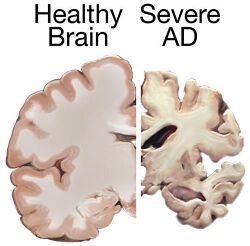Alzheimer's disease
(disease, death cause) | |
|---|---|
 | |
| Interest of | Michael Nehls |
| A neurodegenerative disease that usually starts slowly and progressively worsens | |
Alzheimer's disease (AD) is a neurodegenerative disease that usually starts slowly and progressively worsens.[1] It is the cause of 60–70% of cases of dementia.[1] The most common early symptom is difficulty in remembering recent events.[2] As the disease advances, symptoms can include problems with language, disorientation (including easily getting lost), mood swings, loss of motivation, self-neglect, and behavioral issues.[2][1] As a person's condition declines, they often withdraw from family and society.[2] Gradually, bodily functions are lost, ultimately leading to death.[3] Although the speed of progression can vary, the typical life expectancy following diagnosis is three to nine years.[4]
The cause of Alzheimer's disease is poorly understood.[2] There are many environmental and genetic risk factors associated with its development. The strongest genetic risk factor is from an allele of APOE.[5] Other risk factors include a history of head injury, clinical depression, and high blood pressure.[2] The disease process is largely associated with amyloid plaques, neurofibrillary tangles, and loss of neuronal connections in the brain.[3] A probable diagnosis is based on the history of the illness and cognitive testing with medical imaging and blood tests to rule out other possible causes.[6] Initial symptoms are often mistaken for normal aging.[2] Examination of brain tissue is needed for a definite diagnosis, but this can only take place after death.[3] Good nutrition, physical activity, and engaging socially are known to be of benefit generally in aging, and these may help in reducing the risk of cognitive decline and Alzheimer's; in 2019 clinical trials were underway to look at these possibilities.[3] There are no medications or supplements that have been shown to decrease risk.
No treatments stop or reverse its progression, though some may temporarily improve symptoms.[1] Affected people increasingly rely on others for assistance, often placing a burden on the caregiver.[7] The pressures can include social, psychological, physical, and economic elements.[7] Exercise programs may be beneficial with respect to activities of daily living and can potentially improve outcomes.[8] Behavioral problems or psychosis due to dementia are often treated with antipsychotics, but this is not usually recommended, as there is little benefit and an increased risk of early death.[9][10]
As of 2015, there were approximately 29.8 million people worldwide with AD[11] with about 50 million of all forms of dementia as of 2020.[1] It most often begins in people over 65 years of age, although up to 10 per cent of cases are early-onset affecting those in their 30's to mid 60's.[3] Women get sick more often than men.[12] It affects about 6% of people 65 years and older.[2] In 2015, all forms of dementia resulted in about 1.9 million deaths.[13]
A Alzheimer's disease victim on Wikispooks
| Title | Death date | Location of Death | Description |
|---|---|---|---|
| Kaúlza de Arriaga | 2 February 2004 | Lisbon | Portuguese soldier politician who attended a November 1977 meeting of Le Cercle with his aide |
References
- ↑ a b c d e https://www.who.int/en/news-room/fact-sheets/detail/dementia
- ↑ a b c d e f g https://doi.org/10.1136%2Fbmj.b158
- ↑ a b c d e https://www.nia.nih.gov/health/alzheimers-disease-fact-sheet
- ↑ https://doi.org/10.1056%2FNEJMra0909142
- ↑ https://www.nia.nih.gov/news/study-reveals-how-apoe4-gene-may-increase-risk-dementia
- ↑ https://web.archive.org/web/20141205184403/http://pathways.nice.org.uk/pathways/dementia/dementia-diagnosis-and-assessment.pdf
- ↑ a b https://www.ncbi.nlm.nih.gov/pmc/articles/PMC1951962
- ↑ http://www.scielo.br/scielo.php?script=sci_arttext&pid=S1516-31802014000300195
- ↑ https://web.archive.org/web/20141205183329/https://www.nice.org.uk/advice/ktt7/resources/non-guidance-lowdose-antipsychotics-in-people-with-dementia-pdf
- ↑ https://web.archive.org/web/20141129015823/https://www.fda.gov/drugs/drugsafety/postmarketdrugsafetyinformationforpatientsandproviders/ucm124830.htm
- ↑ https://www.ncbi.nlm.nih.gov/pmc/articles/PMC5055577
- ↑ https://pubmed.ncbi.nlm.nih.gov/20442496/#:~:text=Abstract,longevity%20of%20women%20versus%20men.
- ↑ https://www.ncbi.nlm.nih.gov/pmc/articles/PMC5388903
{{PageCredit |site=Wikipedia |date=31.08.2021 |url=https://en.wikipedia.org/wiki/Alzheimer%27s_disease